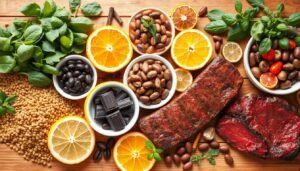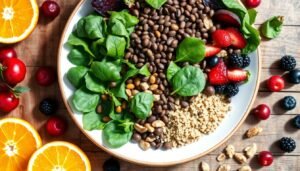Why Are Dry Fruits, Nuts, and Seeds a Good Source of Iron?
Dry fruits, nuts, and seeds are regarded as potent sources of iron due to their rich nutrient content. Iron is a critical mineral that plays a pivotal role in the production of hemoglobin, the protein responsible for transporting oxygen in the blood. Dry fruits like raisins, apricots, and prunes contain significant amounts of non-heme iron, which is particularly beneficial for individuals with anemia.
Nuts such as almonds, cashews, and pistachios are also excellent sources of iron while offering a delightful crunch to meals or snacks. Additionally, the presence of vitamin C in some of these foods boosts iron absorption. Vitamin C helps convert non-heme iron into a more easily absorbable form, making combinations like dried apricots or raisins with a glass of orange juice a great way to boost iron intake effectively.
The fiber content in nuts and seeds supports digestion and gut health, further enhancing iron absorption. Including a variety of dry fruits, nuts, and seeds in your diet not only provides essential nutrients but also adds versatility to meal planning. Snacking on a handful of mixed nuts or enjoying a trail mix with dried fruits is a delicious way to increase your iron intake naturally.

Iron-Rich Dry Fruits and Nuts
Dry fruits and nuts are nutrient powerhouses, with several varieties rich in iron, making them valuable additions to an anemia-focused diet.
- Raisins: These sweet and chewy treats contain around 1.5 mg of iron per quarter cup, providing approximately 8% of the daily recommended iron intake for adults.
- Apricots: Dried apricots are high in fiber and antioxidants, offering a good iron source. Adding a handful to oatmeal or enjoying them as a snack can significantly contribute to your daily iron needs.
- Pistachios: These tasty green nuts are packed with nutrients, including around 1.1 mg of iron per ounce, making them a convenient option for maintaining iron levels. Sprinkle pistachios over salads, yogurt, or enjoy them as a snack to add flavor and nutrition to your diet.
Seeds High in Iron
Seeds are often overlooked, but they are excellent sources of iron, especially pumpkin seeds, sesame seeds, and hemp seeds.
- Pumpkin Seeds: Also known as pepitas, pumpkin seeds are rich in iron, magnesium, and zinc. Just one ounce provides about 4 mg of iron, making them a fantastic addition to your diet.
- Sesame Seeds: These seeds offer around 1.3 mg of iron per tablespoon and are also rich in copper, which supports iron absorption and utilization. Sprinkle sesame seeds on salads or use tahini (sesame seed paste) in dressings to enjoy their nutritional benefits.
- Hemp Seeds: With approximately 2 mg of iron per ounce, hemp seeds are also a good source of protein and healthy fats. Incorporate them into smoothies, sprinkle them over oatmeal or yogurt, or use hemp seed oil in salad dressings for added nutrition.

How to Add Dried Fruits and Seeds to Your Diet
Incorporating dried fruits and seeds into your daily meals for anemia management can be both enjoyable and easy.
- Breakfast: Add dried fruits like apricots, prunes, raisins, and figs to oatmeal or yogurt. They can also be mixed into muffin, bread, or cookie recipes to make nutritious snacks.
- Smoothies and Salads: Blend dried fruits into smoothies or add them to salads for a refreshing way to enjoy their health benefits.
- Chia and Pumpkin Seeds: Soak chia seeds for a pudding-like dessert, or sprinkle pumpkin seeds on salads or soups for added texture.
- Flax and Sunflower Seeds: Ground flaxseeds are perfect for yogurt or cereal, providing omega-3 fatty acids and fiber. Sunflower seeds work well in granola bars or on their own as a snack.
Experiment with these versatile ingredients in stir-fries, rice pilafs, or trail mixes to enjoy new tastes and elevate the nutritional profile of your meals. By balancing these nutrient-rich additions with lean proteins and whole grains, you can support your health while addressing anemia through dietary choices.
Conclusion
Incorporating dry fruits, nuts, and seeds into your diet can be a delicious and beneficial way to manage anemia. These nutrient-dense foods provide an excellent source of iron, essential for producing hemoglobin and red blood cells. Including a variety of iron-rich options like raisins, apricots, almonds, pumpkin seeds, and chia seeds in your meals or snacks can help support healthy blood levels and overall well-being.
The versatility of these foods makes them easy additions to any diet. Whether sprinkled on yogurt or salads, blended into smoothies, or enjoyed as snacks, there are countless ways to incorporate these iron-boosting ingredients. Embracing this natural approach to increasing iron intake not only promotes health but also adds flavor and texture to meals, enhancing your dining experience.
Remember that small, mindful changes in your diet can lead to significant improvements in well-being. With a bit of creativity, these nutrient-dense foods can help boost iron levels naturally and provide hope for those looking to manage anemia with delicious and healthy choices.